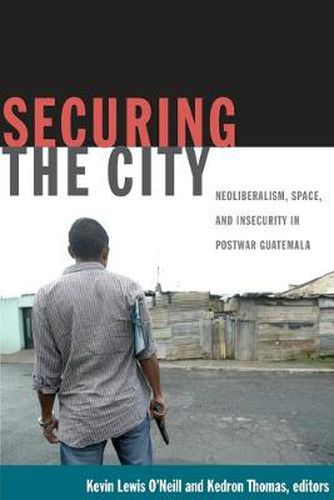Readings Newsletter
Become a Readings Member to make your shopping experience even easier.
Sign in or sign up for free!
You’re not far away from qualifying for FREE standard shipping within Australia
You’ve qualified for FREE standard shipping within Australia
The cart is loading…






Unprecedented crime rates have made Guatemala City one of the most dangerous cities in the world. Following a peace process that ended Central America’s longest and bloodiest civil war and impelled the transition from a state-centric economy to the global free market, Guatemala’s neoliberal moment is now strikingly evident in the practices and politics of security. Postwar violence has not prompted public debates about the conditions that permit transnational gangs, drug cartels, and organized crime to thrive. Instead, the dominant reaction to crime has been the cultural promulgation of fear and the privatization of what would otherwise be the state’s responsibility to secure the city. This collection of essays, the first comparative study of urban Guatemala, explores these neoliberal efforts at security. Contributing to the anthropology of space and urban studies, this book brings together anthropologists and historians to examine how postwar violence and responses to it are reconfiguring urban space, transforming the relationship between city and country, and exacerbating deeply rooted structures of inequality and ethnic discrimination.Contributors. Peter Benson, Manuela Camus, Avery Dickins de Giron, Edward F. Fischer, Deborah Levenson, Thomas Offit, Kevin Lewis O'Neill, Kedron Thomas, Rodrigo Jose Veliz
$9.00 standard shipping within Australia
FREE standard shipping within Australia for orders over $100.00
Express & International shipping calculated at checkout
Unprecedented crime rates have made Guatemala City one of the most dangerous cities in the world. Following a peace process that ended Central America’s longest and bloodiest civil war and impelled the transition from a state-centric economy to the global free market, Guatemala’s neoliberal moment is now strikingly evident in the practices and politics of security. Postwar violence has not prompted public debates about the conditions that permit transnational gangs, drug cartels, and organized crime to thrive. Instead, the dominant reaction to crime has been the cultural promulgation of fear and the privatization of what would otherwise be the state’s responsibility to secure the city. This collection of essays, the first comparative study of urban Guatemala, explores these neoliberal efforts at security. Contributing to the anthropology of space and urban studies, this book brings together anthropologists and historians to examine how postwar violence and responses to it are reconfiguring urban space, transforming the relationship between city and country, and exacerbating deeply rooted structures of inequality and ethnic discrimination.Contributors. Peter Benson, Manuela Camus, Avery Dickins de Giron, Edward F. Fischer, Deborah Levenson, Thomas Offit, Kevin Lewis O'Neill, Kedron Thomas, Rodrigo Jose Veliz